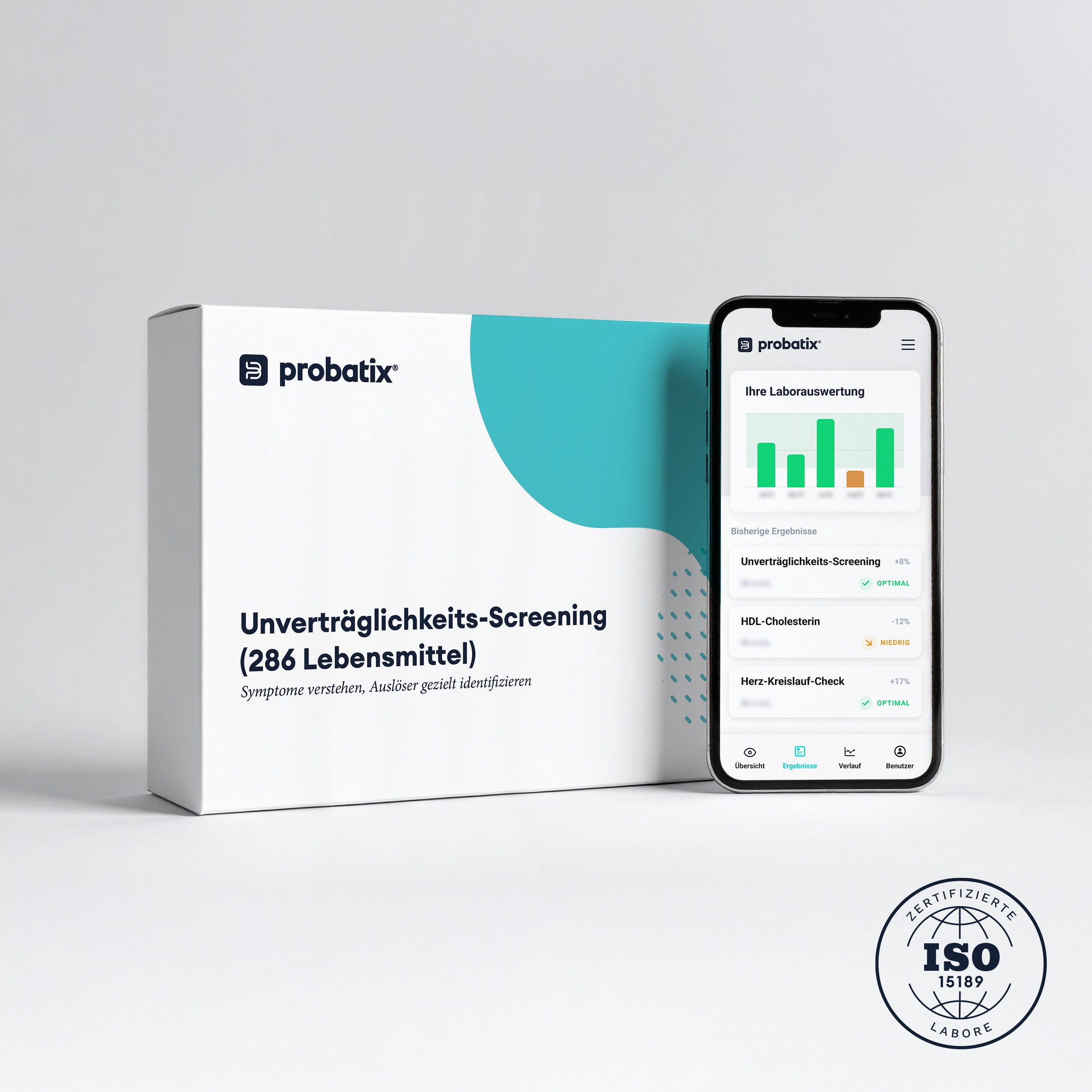Intolerance Screening (286 Foods)
Intolerance Screening (286 Foods)
Identify hidden intolerances – for improved well-being and targeted nutrition.
- Comprehensive analysis: Screening for 286 potentially intolerable foods and substances.
- Early detection: Identifies possible triggers for digestive issues, skin reactions, and fatigue.
- Simple & flexible: Sampling conveniently from home, evaluation by a professional laboratory.
A clear overview – when the body reacts to seemingly healthy things.
Tip: The Intolerance Screening is also part of our Combo Screening "Allergies & Intolerances".
In stock
What values does this test measure?
What values does this test measure?
Further information on the values can be found here.
How does it work?
How does it work?
1. Take a sample with our test kit
2. Send the sample to the lab using the prepaid envelope
3. View results digitally after a few days
Why are the values reliable?
Why are the values reliable?
All tests offered by us are evaluated and validated in certified medical laboratories in Germany.
Das sagen unsere Kunden
Intolerance Screening (286 Foods): All details about the test
What benefits does this test offer me?
What benefits does this test offer me?
Find out what your body is missing – comprehensive analysis of 286 intolerances.
The Intolerance Check 286 specifically examines a wide range of foods and other substances that can potentially trigger intolerances. With this analysis, you can identify which substances are burdening your body and adjust your diet accordingly.
Why is this test important? Intolerances can manifest through symptoms such as digestive issues, skin irritations, or fatigue and often go undetected. With this test, you gain clarity and can actively prevent discomfort.
Your benefits:
- Comprehensive analysis: Test for 286 potentially intolerant substances.
- Simple and convenient: Sample collection flexibly from home.
- Clear feedback: Your individual report shows you which substances your body reacts to.
Discover what is good for you – with the Intolerance Check 286 from Probatix.
For an even more comprehensive analysis, we also offer a Combo Check "Allergies and Intolerances".
What do the measured values mean?
What do the measured values mean?
This test checks various biomarkers. You can find details in the test description.
Why is this test important?
Why is this test important?
- Identifies intolerances that cause digestive problems or other complaints
- Helps to find the right diet and prevent deficiencies in the long term
- Provides precise results for individual nutritional solutions
When should I take this test?
When should I take this test?
- html
- In case of persistent digestive issues such as bloating, diarrhea, or stomach pain
- If you suspect a food intolerance
- In case of unexplained symptoms such as headaches, skin problems, or fatigue
For an accurate interpretation of the results and individual recommendations, please consult a doctor.
Which values are tested?
The following values, among others, are tested:
- Milk & Egg
- Buffalo milk
- Buttermilk
- Camel milk
- Camembert
- Cottage cheese
- Cow's milk
- Protein
- Egg yolk
- Emmental cheese
- Goat cheese
- Goat milk
- Gouda
- Mozzarella
- Parmesan
- Quail egg
- Sheep cheese
- Sheep milk
- Meat
- Beef
- Wild boar
- Chicken
- Duck
- Goat
- Horse
- Lamb
- Ostrich
- Pork
- Rabbit
- Deer
- Turkey
- Veal
- Venison
- Fish & Seafood
- Abalone
- Cod
- Atlantic Herring
- Redfish
- Carp
- Caviar
- Cockle
- Mussel
- Crab
- Eel
- European Anchovy
- European Sardine
- European Plaice
- Gilt-head Bream
- Haddock
- Hake
- Lobster
- Mackerel
- Monkfish
- Noble Crayfish
- Pike
- Shrimp
- Octopus
- Oyster
- Razor Clam
- Salmon html
- Scallop
- Cuttlefish
- Shrimp Mix
- Sole
- Octopus
- Swordfish
- Ray
- Trout
- Tuna
- Turbot
- Clam
- Grains & Seeds
- Amaranth
- Barley
- Buckwheat
- Corn
- Durum Wheat
- Einkorn
- Emmer
- Gluten
- Hemp Seeds
- Flax Seeds
- Lupin Seeds
- Barley Malt
- Millet &Oats
- Pine Nut
- Polish Wheat
- Poppy Seeds
- Pumpkin Seeds
- Quinoa
- Rapeseed html
- Rice
- Rye
- Sesame
- Spelt
- Sunflower seed
- Wheat
- Wheat bran
- Wheatgrass
- Almond
- Brazil nut
- Cashew
- Coconut
- Coconut milk
- Hazelnut
- Kola nut
- Macadamia
- Pecan
- Pistachios
- Chestnuts
- Tiger nut
- Walnut
- Chickpeas
- Green bean
- Lentil
- Mung bean
- Peanut
- Pea
- Soybean
- Sugar snap pea html
- Tamarind
- White Bean
- Apple
- Apricot
- Banana
- Blackberry
- Blueberry
- Cherry
- Cranberry
- Date
- Elderberry
- Fig
- Gooseberry
- Grape
- Grapefruit
- Kiwi
- Lemon
- Lime
- Lychee
- Mango
- Melon
- Mulberry
- Nectarine
- Orange
- Papaya
- Passion Fruit
- Peach
- Pear
- Physalis
- Pineapple
- Plum
- Pomegranate
- Raisin
- Raspberry
- Red Currant
- Strawberry
- Mandarin
- Watermelon
- Artichoke
- Arugula
- Avocado
- Bamboo Shoots
- Broccoli
- Brussels Sprouts
- Cabbage
- Caper
- Carrot
- Cauliflower
- Celery Root
- Celery Stalks
- Swiss Chard
- Chicory
- Chinese Cabbage
- Chives
- Cucumber
- Eggplant
- Endive
- Fennel
- Garlic
- Horseradish
- Kiwano
- Kohlrabi
- Lamb's Lettuce html
- Leek
- Nettle leaves
- Olive
- Onion
- Parsnip
- Bok choy
- Potato
- Butternut squash
- Hokkaido pumpkin
- Radicchio
- Radish
- Beetroot
- Red cabbage
- Romanesco
- Savoy cabbage
- Shallot
- Spinach
- Sweet potato
- Tomato
- Rutabaga
- Cress
- Asparagus
- White cabbage
- Wild garlic
- Zucchini
- Anise
- Basil
- Bay leaf
- Caraway
- Cardamom
- Cayenne pepper html
- Chili (red)
- Cinnamon
- Clove
- Coriander
- Cumin
- Curry
- Dill
- Fenugreek
- Ginger
- Juniper berry
- Lemongrass
- Marjoram
- Mint
- Mustard
- Nutmeg
- Oregano
- Paprika
- Parsley
- Pepper (black/white/green/red/yellow)
- Rosemary
- Sage
- Tarragon
- Thyme
- Turmeric
- Vanilla
- Porcini
- Chanterelle
- Enoki
- King Oyster Mushroom
- Oyster Mushroom html
- White Mushroom
- Almond Milk
- Aloe
- Aronia
- Baobab
- Chia Seeds
- Chlorella
- Dandelion Root
- Ginkgo
- Ginseng
- Greater Burdock Root
- Guarana
- Migratory Locust
- Maca Root
- Mealworm
- Cricket
- Nori
- Safflower Oil
- Spirulina
- Tapioca
- Wakame
- Yacon Root
- Chamomile
- Cocoa
- Coffee
- Hibiscus
- Jasmine Tea
- Moringa html
- Peppermint
- Black Tea
- Green Tea
- Agar Agar
- Aspergillus niger
- Baker's Yeast
- Brewer's Yeast
- Cane Sugar
- Elderflower
- Honey
- Hops
- Meat Glue (M-Transglutaminase)
What is included in the test kit?
What is included in the test kit?
Where can I find the instructions?
Where can I find the instructions?
Bei Fragen hilft Ihnen auch immer gerne unser wunderbarer Support weiter: support@probatix.de
FAQ - More Frequently Asked Questions about the Test
FAQ - More Frequently Asked Questions about the Test
1. What does the Intolerance Check 286 measure?
The Intolerance Check 286 tests for numerous food intolerances to determine which foods your body does not tolerate well. Various food groups such as dairy products, gluten, nuts, and more are analyzed.
2. Who is the Intolerance Check suitable for?
The test is ideal for people who frequently suffer from digestive issues, bloating, diarrhea, or fatigue after eating and suspect that a food intolerance is the cause.
3. What symptoms can indicate a food intolerance?
Symptoms such as bloating, abdominal pain, diarrhea, headaches, or fatigue after consuming certain foods can indicate an intolerance.
4.How is the intolerance check conducted?
The test is performed through a blood sample, which you can conveniently take from home. Your sample is sent to our laboratory and analyzed.
5. How long does it take for the results to be available?
The results are usually available within a few days in your personal Probatix dashboard.
6. What can I do with the results?
Based on the test results, you can determine which foods you may not tolerate. This information helps you adjust your diet and avoid the triggers of your symptoms.
7. Can the test also be conducted with mild symptoms?
Yes, even with mild symptoms, the test can provide valuable information to detect food intolerances early and take appropriate action.
8.What is the difference between an allergy and an intolerance?
An allergy is an immune system reaction to certain substances, while an intolerance indicates the body's difficulty in properly processing certain foods.
9. What can I do if the test shows an intolerance?
If an intolerance is detected, you should avoid the corresponding foods and possibly adjust your diet in consultation with a nutritionist or doctor.
10. How often should I perform the intolerance check?
It is recommended to repeat the test if symptoms recur or if your complaints change, to ensure that no new intolerances occur.


















